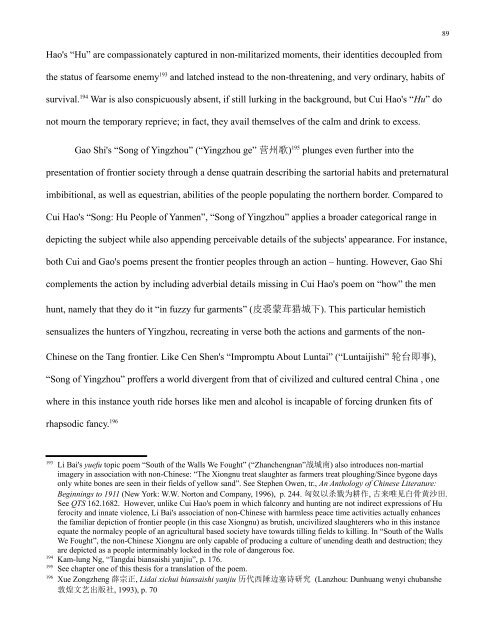View/Open - University of Victoria
View/Open - University of Victoria
View/Open - University of Victoria
Create successful ePaper yourself
Turn your PDF publications into a flip-book with our unique Google optimized e-Paper software.
Hao's “Hu” are compassionately captured in non-militarized moments, their identities decoupled from<br />
the status <strong>of</strong> fearsome enemy 193 and latched instead to the non-threatening, and very ordinary, habits <strong>of</strong><br />
survival. 194 War is also conspicuously absent, if still lurking in the background, but Cui Hao's “Hu” do<br />
not mourn the temporary reprieve; in fact, they avail themselves <strong>of</strong> the calm and drink to excess.<br />
89<br />
Gao Shi's “Song <strong>of</strong> Yingzhou” (“Yingzhou ge” 营 州 歌 ) 195 plunges even further into the<br />
presentation <strong>of</strong> frontier society through a dense quatrain describing the sartorial habits and preternatural<br />
imbibitional, as well as equestrian, abilities <strong>of</strong> the people populating the northern border. Compared to<br />
Cui Hao's “Song: Hu People <strong>of</strong> Yanmen”, “Song <strong>of</strong> Yingzhou” applies a broader categorical range in<br />
depicting the subject while also appending perceivable details <strong>of</strong> the subjects' appearance. For instance,<br />
both Cui and Gao's poems present the frontier peoples through an action – hunting. However, Gao Shi<br />
complements the action by including adverbial details missing in Cui Hao's poem on “how” the men<br />
hunt, namely that they do it “in fuzzy fur garments” ( 皮 裘 蒙 茸 猎 城 下 ). This particular hemistich<br />
sensualizes the hunters <strong>of</strong> Yingzhou, recreating in verse both the actions and garments <strong>of</strong> the non-<br />
Chinese on the Tang frontier. Like Cen Shen's “Impromptu About Luntai” (“Luntaijishi” 轮 台 即 事 ),<br />
“Song <strong>of</strong> Yingzhou” pr<strong>of</strong>fers a world divergent from that <strong>of</strong> civilized and cultured central China , one<br />
where in this instance youth ride horses like men and alcohol is incapable <strong>of</strong> forcing drunken fits <strong>of</strong><br />
rhapsodic fancy. 196<br />
193<br />
Li Bai's yuefu topic poem “South <strong>of</strong> the Walls We Fought” (“Zhanchengnan” 战 城 南 ) also introduces non-martial<br />
imagery in association with non-Chinese: “The Xiongnu treat slaughter as farmers treat ploughing/Since bygone days<br />
only white bones are seen in their fields <strong>of</strong> yellow sand”. See Stephen Owen, tr., An Anthology <strong>of</strong> Chinese Literature:<br />
Beginnings to 1911 (New York: W.W. Norton and Company, 1996), p. 244. 匈 奴 以 杀 戮 为 耕 作 , 古 来 唯 见 白 骨 黄 沙 田 .<br />
See QTS 162.1682. However, unlike Cui Hao's poem in which falconry and hunting are not indirect expressions <strong>of</strong> Hu<br />
ferocity and innate violence, Li Bai's association <strong>of</strong> non-Chinese with harmless peace time activities actually enhances<br />
the familiar depiction <strong>of</strong> frontier people (in this case Xiongnu) as brutish, uncivilized slaughterers who in this instance<br />
equate the normalcy people <strong>of</strong> an agricultural based society have towards tilling fields to killing. In “South <strong>of</strong> the Walls<br />
We Fought”, the non-Chinese Xiongnu are only capable <strong>of</strong> producing a culture <strong>of</strong> unending death and destruction; they<br />
are depicted as a people interminably locked in the role <strong>of</strong> dangerous foe.<br />
194<br />
Kam-lung Ng, “Tangdai biansaishi yanjiu”, p. 176.<br />
195<br />
See chapter one <strong>of</strong> this thesis for a translation <strong>of</strong> the poem.<br />
196<br />
Xue Zongzheng 薛 宗 正 , Lidai xichui biansaishi yanjiu 历 代 西 陲 边 塞 诗 研 究 (Lanzhou: Dunhuang wenyi chubanshe<br />
敦 煌 文 艺 出 版 社 , 1993), p. 70
















